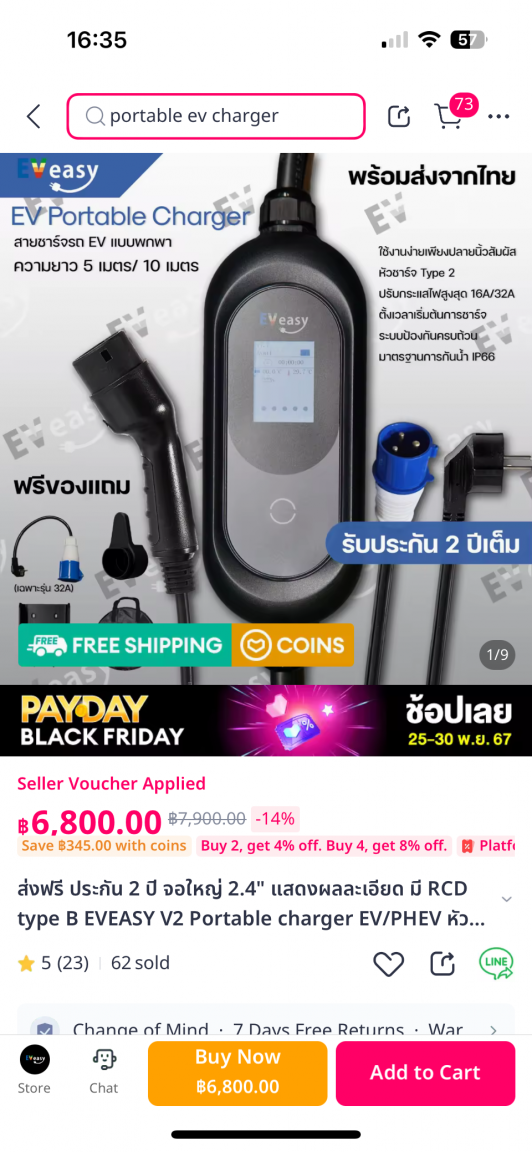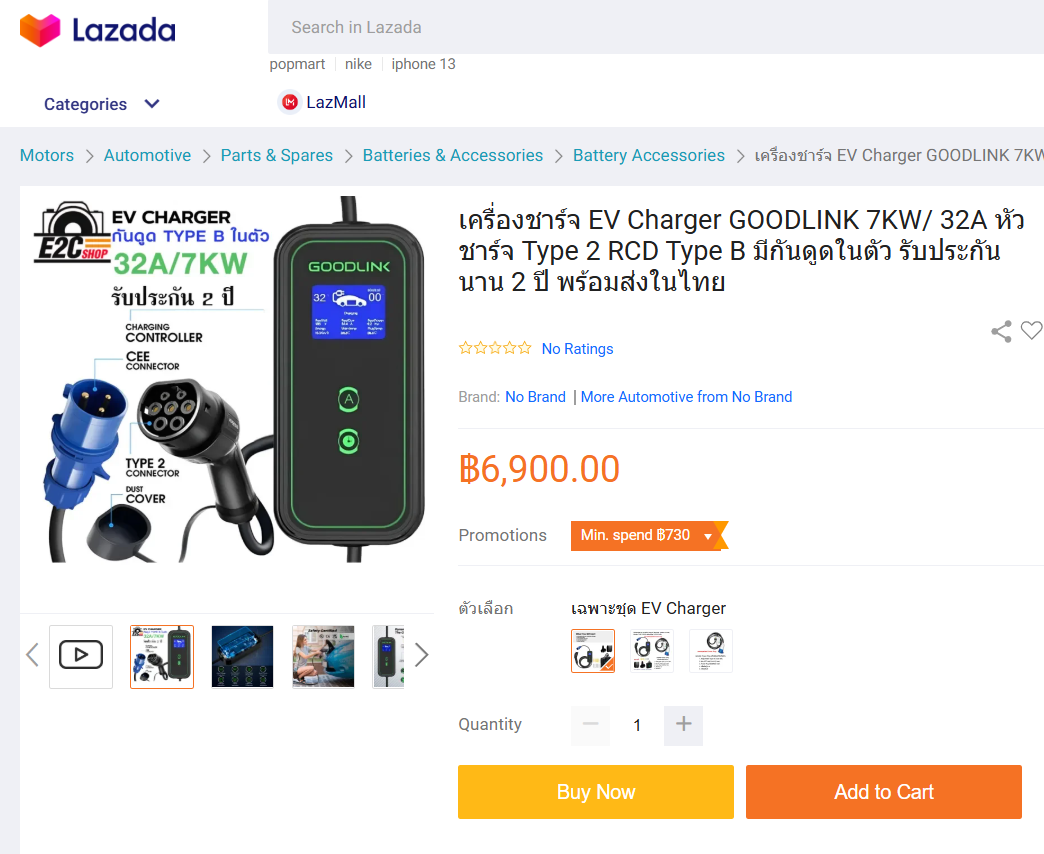
JBChiangRai
Advanced Member-
Posts
6,303 -
Joined
-
Last visited
-
Days Won
1
Content Type
Events
Forums
Downloads
Quizzes
Gallery
Blogs
Everything posted by JBChiangRai
-
I have a lady friend 76 years old who has MG4 X-Power and she only charges at PTT/Amazon about once a week. She enjoys a coffee whilst she charges and reads the news. Whilst it costs double charging at home, it's still half the cost of petrol/diesel.
-
I read the same report and can confirm tesla is doing, indeed have the most Lethal accidents just google Tesla most lethal and you will find all the links
-
we had language difficulties at the showroom yesterday, but I specifically asked if it was 800 V architecture or 400 V and the salesman said 400 V, but I wouldn’t necessary believe that
-
You have a fairly decent sized breaker panel, I would be very surprised if your meter is anything less than a 15/45 amp meter which IMHO is adequate. A lot of installers want to see a dedicated 15/45 amp meter just for the EV or a larger meter if just the one for house and car. The reason I wouldn't let BYD install their wall box was because I didn't want to change my meter. I have a nice spinning disk meter and I don't want a digital one (those with solar power will know why). I used a plug-in charger of 32 amps 7Kw and later installed the BYD ABB box myself on a 32 amp plug so I will take it with me when I leave, the ABB wall box is a superb device.
-
Is there a wall socket where you want to charge? You may like to forget buying a wall charger and buy one of these, it’s switchable 8, 10, 13 and 16 amps. Choose the 16 amp version with 5 or 10 meter cable. You should be able to charge at 13 amps (2.9kw) and maybe full the full 16 amps, 3.6kw. A 10 hour overnight charge is going to put over 25kwhrs in the battery at 13 amps, that’s about 200km depending on car. I have one of these we take away with us when we go and stay in hotels.
-
Incidentally I paid 2,500 baht labour plus a few hundred baht for parts to the electrician to install a 32 amp socket at our landlord's home. The socket was only a cable run of about 2M from the breaker panel and these plug in chargers charge at the same speed as a wall box.
-
I sat in a Sealion 7 yesterday morning, it has the dashboard of the new Seal when it comes, I like the dashboard a lot. Salesmen told me the price was reduced to 1.1M for premium and 1.2M for Performance until December 10th, but this doesn't fit with the graphic posted earlier.
-
It is probably on a concrete pole. In any event, an electrician would check this before installing a 32 amp socket and refuse to do it if it's a 5/15 amp meter. Your landlord should be pleased that you are leaving a 32 amp socket for future tenants to plug in an EV charger. Hopefully, he will give his permission. Before we bought a home in Chiang Mai we rented for 2 months and the landlord was very happy I fitted a socket at my own expense.
-
Can you take a photo of your PEA meter outside the property? 60amp breaker like that is fine, typically they are 63 amp breakers on a 15/45 amp meter.
-
Electric Vehicles in Thailand
JBChiangRai replied to Bandersnatch's topic in Thailand Motor Discussion
The Consumer Protection Board wish to thank Rever for the gifts, they needed those brown envelops for postage. -
A well thought out, well qualified post, do you even know what day it is?
-
My advice is post a picture of your electric meter, if it's 15/45amp or larger... Don't buy the charger they are offering you, if it's free, take it and keep it in the box) or sell it. Pay a local electrician to fit the 32amp socket (I posted a picture of) on the wall where you want your charger and use a 40 amp breaker. Buy the device in the picture or similar. Choose one with a 32 amp plug pre-fitted and ideally switchable from 32 amps down to 8 or 10 amps. Unplug it and take it with you when you leave. We did that at both our houses.
-
Electric Vehicles in Thailand
JBChiangRai replied to Bandersnatch's topic in Thailand Motor Discussion
I wouldn’t use the word obsolete, I think we will see incremental improvement, but at no time will we see obsolescence. -
This is the wall mounted 32 amp socket and cable mounted 32 amp plug enabling you to take your wall charger with you.
-
I did get another Viriyah quote from Rabbit Care, about 250 baht cheaper, coverage 200k THB less at 1M, but battery cover 100% (previous quote is 90% battery cover). I am going with first quote as I think if you need a new battery, more often than not you’ve written off the car. But I would be interested in what everyone else thinks?
-
My neighbour has the middle Seal, he only uses his granny charger too.
-
Viriyah quote for Seal Performance with 5 named drivers of any age was 30,000 baht for 1.2M baht coverage. I’m going to go with that I think.
-
My advice is to have a 32 amp socket fitted where you want the wall charger and have the wall charger fitted with a 32 amp plug, you can then unplug it and take it with you when you move house. We have done this in our 2 houses. You need to check your meter, if it says 30/90 or 30/100 you won’t necessarily need a second line, if it’s 15/45 you will unless you have your own electrician install the 32 amp plug and socket I referred to above. If your meter says 5/15 you will definitely need a second line. You can operate with the supplied (granny) charger until you have a wall charger installed.
-
The crimes I specifically mentioned, are well documented ... Israel uses sniper drones in Gaza, eyewitnesses say : NPR Gaza surgeon describes drones targeting children A crime can be alleged or proven, in either case it's still a crime until disproven. There is no "maybe", they ARE illegal. I notice you didn't comment on your (IMHO) obvious bias. I don't believe Netanyahu is interested in freeing the hostages. His strategy seems to be destruction of domiciles and infrastructure and I suspect this is a prelude to a land grab, in line with the map he presented to the UN on September 22nd 2023 showing Gaza and the West Bank as Israel. I will be exceedingly surprised if this war ends with the whole of Gaza still being Palestine.
-
I never used twitter, my account sat dormant for years, I'm not sure I would use Bluesky either.
-
Thai police banned from collecting fees for red checkpoint boxes
JBChiangRai replied to snoop1130's topic in Bangkok News
My friend pays every month, but he asked for a deal, in return they let him pass their checkpoint 1km from his house if he drives home inebriated.









